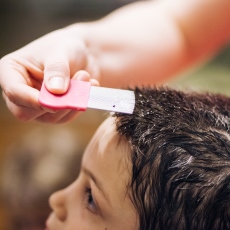Head Lice

Learn More
- No links available
See, Play and Learn
- No links available
Research
Resources
For You
Summary
What are head lice?
Head lice are tiny insects that live on people's heads. Adult lice are about the size of sesame seeds. The eggs, called nits, are even smaller - about the size of a dandruff flake. Lice and nits are found on or near the scalp, most often at the neckline and behind the ears.
Head lice are parasites, and they need to feed on human blood to survive. They are one of the three types of lice that live on humans. The other two types are body lice and pubic lice. Each type of lice is different, and getting one type does not mean that you will get another type.
How do head lice spread?
Lice move by crawling, because they cannot hop or fly. They spread by close person-to-person contact. Rarely, they can spread through sharing personal belongings such as hats or hairbrushes. Personal hygiene and cleanliness have nothing to do with getting head lice. You also cannot get pubic lice from animals. Head lice do not spread disease.
Who is at risk for head lice?
Children ages 3-11 and their families get head lice most often. This is because young children often have head-to-head contact while playing together.
What are the symptoms of head lice?
The symptoms of head lice include
- Tickling feeling in the hair
- Frequent itching, which is caused by an allergic reaction to the bites
- Sores from scratching. Sometimes the sores can become infected with bacteria.
- Trouble sleeping, because head lice are most active in the dark
How do you know if you have head lice?
A diagnosis of head lice usually comes from seeing a louse or nit. Because they are very small and move quickly, you may need to use a magnifying lens and a fine-toothed comb to find lice or nits.
What are the treatments for head lice?
Treatments for head lice include both over-the-counter and prescription shampoos, creams, and lotions. If you want to use an over-the-counter treatment and you aren't sure which one to use or how to use one, ask your health care provider or pharmacist. You should also check with your health care provider first if you are pregnant or nursing, or if you want to use a treatment on a young child.
Follow these steps when using a head lice treatment:
- Apply the product according to the instructions. Only apply it to the scalp and the hair attached to the scalp. You should not use it on other body hair.
- Use only one product at a time, unless your health care provider tells you to use two different kinds at once
- Pay attention to what the instructions say about how long you should leave the medicine on the hair and on how you should rinse it out
- After rinsing, use a fine-toothed comb or special "nit comb" to remove dead lice and nits
- After each treatment, check your hair for lice and nits. You should comb your hair to remove nits and lice every 2-3 days. Do this for 2-3 weeks to be sure that all lice and nits are gone.
All household members and other close contacts should be checked and treated if necessary. If an over-the-counter treatment does not work for you, you can ask your health care provider for a prescription product.
Can head lice be prevented?
There are steps you can take to prevent the spread of lice. If you already have lice, besides treatment, you should
- Wash your clothes, bedding, and towels with hot water, and dry them using the hot cycle of the dryer
- Soak your combs and brushes in hot water for 5-10 minutes
- Vacuum the floor and furniture, particularly where you sat or lay
- If there are items that you cannot wash, seal them in a plastic bag for two weeks
To prevent your children from spreading lice:
- Teach children to avoid head-to-head contact during play and other activities
- Teach children not to share clothing and other items that they put on their head, such as headphones, hair ties, and helmets
- If your child has lice, be sure to check the policies at school and/or daycare. Your child may not be able to go back until the lice have been completely treated.
There is no clear scientific evidence that lice can be suffocated by home remedies, such as mayonnaise, olive oil, or similar substances. You also should not use kerosene or gasoline; they are dangerous and flammable.
Centers for Disease Control and Prevention
Diagnosis and Tests
- Head Lice: Diagnosis (Centers for Disease Control and Prevention) Also in Spanish
Prevention and Risk Factors
- Head Lice: Prevention and Control (Centers for Disease Control and Prevention) Also in Spanish
Treatments and Therapies
- Head Lice: Malathion Frequently Asked Questions (Centers for Disease Control and Prevention)
- Head Lice: Treatment (Centers for Disease Control and Prevention) Also in Spanish
- Head Lice: Treatment Frequently Asked Questions (FAQs) (Centers for Disease Control and Prevention) Also in Spanish
Clinical Trials
-
ClinicalTrials.gov: Head Lice
 (National Institutes of Health)
(National Institutes of Health)
Journal Articles References and abstracts from MEDLINE/PubMed (National Library of Medicine)
Children
- Head Lice (For Parents) (Nemours Foundation)
- Head Lice (Pediculosis Capitis) (Logical Images)
- Head Lice: Information for Parents (Centers for Disease Control and Prevention)
- Lice Aren't So Nice (Nemours Foundation) Also in Spanish
Patient Handouts
- Head lice (Medical Encyclopedia) Also in Spanish
- Treating Head Lice (Food and Drug Administration)
